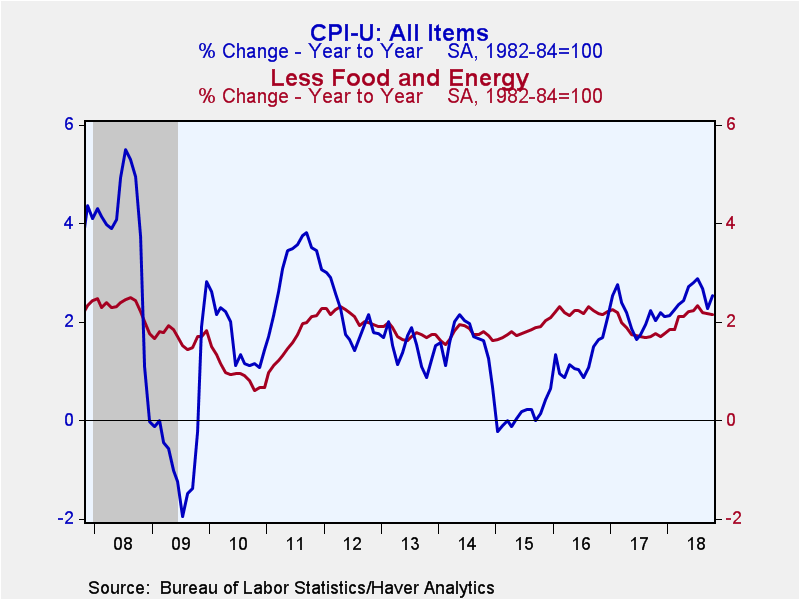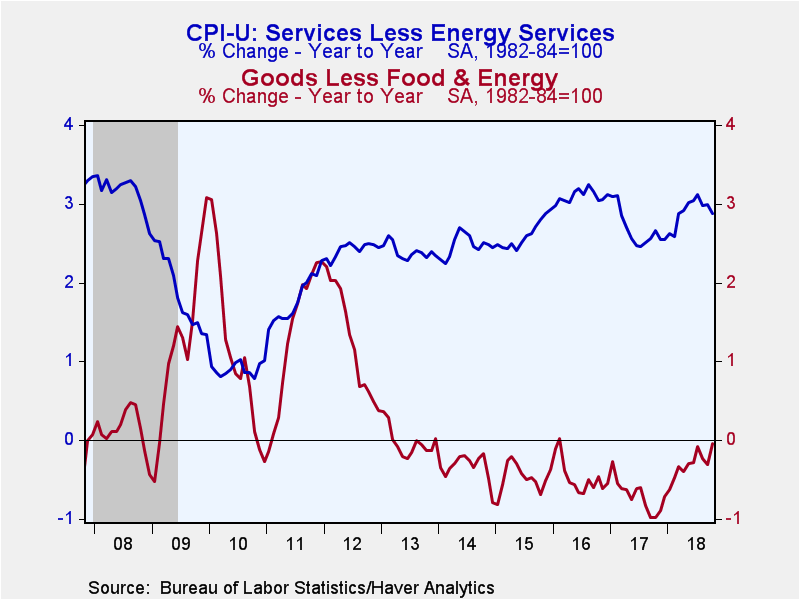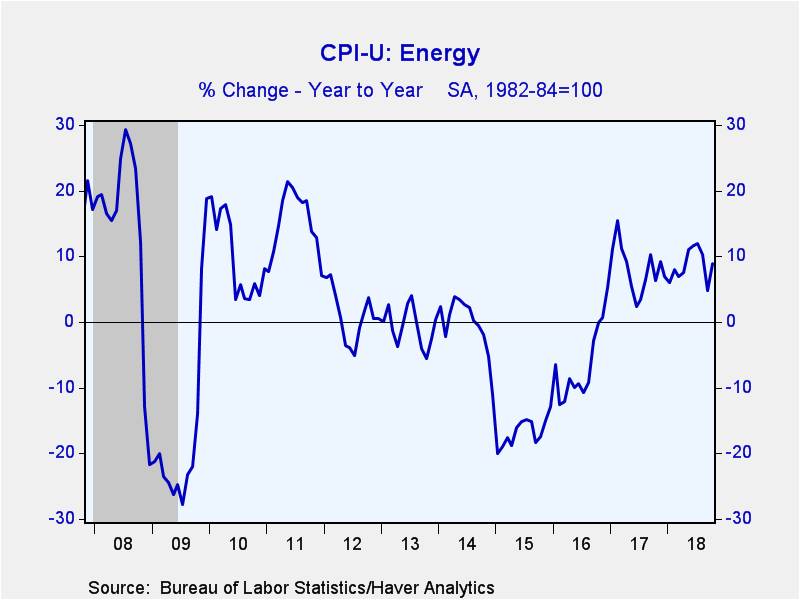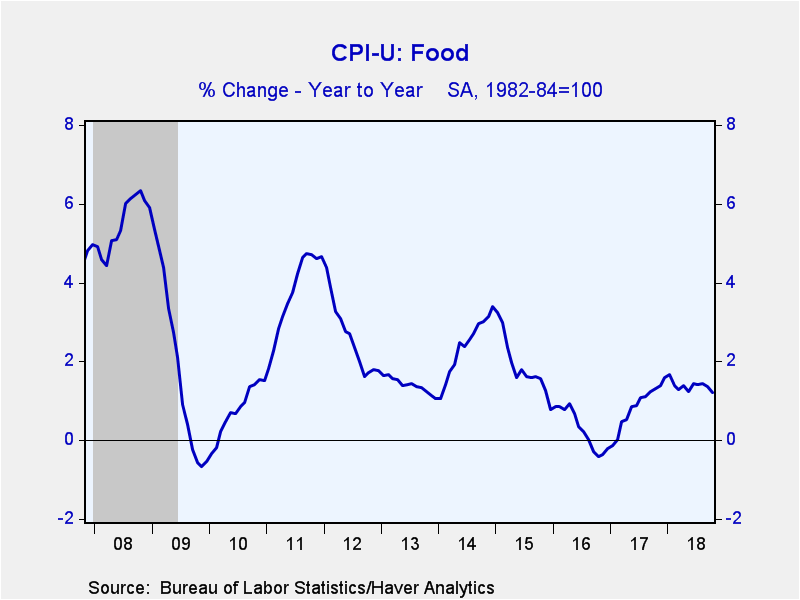 Global| Nov 14 2018
Global| Nov 14 2018U.S. CPI Total and Core Strengthen
by:Tom Moeller
|in:Economy in Brief
Summary
The Consumer Price Index rose 0.3% during October (2.5% y/y), the strongest increase in nine months. The increase matched expectations in the Action Economics Forecast Survey. The CPI, excluding food & energy, improved an expected [...]
The Consumer Price Index rose 0.3% during October (2.5% y/y), the strongest increase in nine months. The increase matched expectations in the Action Economics Forecast Survey. The CPI, excluding food & energy, improved an expected 0.2% (2.1% y/y) following two months of 0.1% gain.
A 2.4% rise (8.9% y/y) in energy prices led the CPI higher, paced by a 3.7% rise (26.2% y/y) in fuel oil prices. Gasoline prices increased 3.0% (16.1% y/y) to the highest average price (all grades) since November 2014. Electricity costs strengthened 2.3% (0.7% y/y), but natural gas prices eased 0.6% (-2.1% y/y).
Nonenergy services prices increased 0.2% (2.9% y/y) for the third consecutive month. The owners' equivalent rent of primary residence gained 0.3% (3.3% y/y) while rents of primary residences rose a weakened 0.2% (3.6% y/y). Hotel costs declined 2.1% (-2.4% y/y). The cost of transportation services inched 0.1% higher (3.8% y/y) as motor vehicle insurance prices rose 0.5% (6.7% y/y). The cost of public transportation declined 0.1% (-0.5% y/y). Recreation services costs held steady (1.9% y/y). Health care costs increased 0.2% (1.9% y/y) as they did in September.
Goods prices excluding food & energy rose 0.3% (-0.1% y/y) and followed two months of 0.3% decline. Used car & truck prices improved 2.6% (0.4% y/y) and offset a 0.2% decline (+0.5% y/y) in new vehicle prices. Appliance prices jumped 1.6% (4.9% y/y) and have been strengthening since early this year. Household furnishings costs increased 0.4% (0.7% y/y) after declining moderately in each of the last five years. Apparel prices rose 0.1% (-0.4% y/y). These gains were offset by education and communications goods prices which declined 1.5% (-3.3% y/y) after a 0.2% gain. Medical care product prices eased 0.1% (+0.7% y/y) while recreation goods costs eased 0.5% (-3.5% y/y).
Food prices slipped 0.1% (+1.2% y/y) following three months of little change. Fruit & vegetable prices weakened 0.7% (-0.4% y/y), the third straight month of decline. Cereal & bakery product prices fell 0.6% (+0.5% y/y) and reversed the September increase. Dairy & related product costs fell 0.4% (-0.2% y/y), down for the third month in the last four. Meat, poultry & fish prices held steady (-0.4% y/y) while egg prices rose 0.3% (+2.8% y/y) after five straight months of decline. Nonalcoholic beverage prices gained 0.2% (0.9% y/y).
The gain in consumer prices caused real average hourly earnings to slip 0.1% (+0.7% y/y), the first decline since February.
The consumer price data can be found in Haver's USECON database with additional detail in CPIDATA. The Action Economics survey figure is in the AS1REPNA database.
| Consumer Price Index, All Urban Consumers (% chg) | Oct | Sep | Aug | Oct Y/Y | 2017 | 2016 | 2015 |
|---|---|---|---|---|---|---|---|
| Total | 0.3 | 0.1 | 0.2 | 2.5 | 2.1 | 1.3 | 0.1 |
| Total less Food & Energy | 0.2 | 0.1 | 0.1 | 2.1 | 1.8 | 2.2 | 1.8 |
| Goods less Food & Energy | 0.3 | -0.3 | -0.3 | -0.1 | -0.7 | -0.5 | -0.5 |
| Services less Energy | 0.2 | 0.2 | 0.2 | 2.9 | 2.7 | 3.1 | 2.6 |
| Food | -0.1 | 0.0 | 0.1 | 1.2 | 0.9 | 0.3 | 1.9 |
| Energy | 2.4 | -0.5 | 1.9 | 8.9 | 7.9 | -6.6 | -16.7 |
Tom Moeller
AuthorMore in Author Profile »Prior to joining Haver Analytics in 2000, Mr. Moeller worked as the Economist at Chancellor Capital Management from 1985 to 1999. There, he developed comprehensive economic forecasts and interpreted economic data for equity and fixed income portfolio managers. Also at Chancellor, Mr. Moeller worked as an equity analyst and was responsible for researching and rating companies in the economically sensitive automobile and housing industries for investment in Chancellor’s equity portfolio. Prior to joining Chancellor, Mr. Moeller was an Economist at Citibank from 1979 to 1984. He also analyzed pricing behavior in the metals industry for the Council on Wage and Price Stability in Washington, D.C. In 1999, Mr. Moeller received the award for most accurate forecast from the Forecasters' Club of New York. From 1990 to 1992 he was President of the New York Association for Business Economists. Mr. Moeller earned an M.B.A. in Finance from Fordham University, where he graduated in 1987. He holds a Bachelor of Arts in Economics from George Washington University.
More Economy in Brief
 Global| Feb 05 2026
Global| Feb 05 2026Charts of the Week: Balanced Policy, Resilient Data and AI Narratives
by:Andrew Cates










